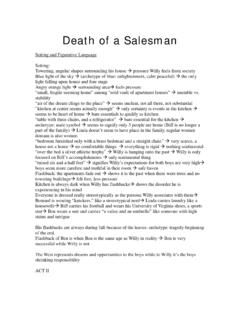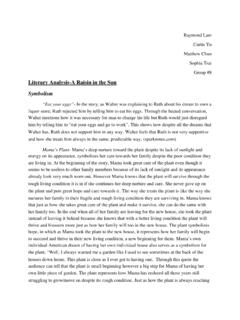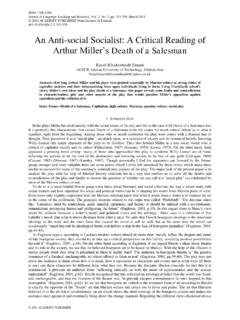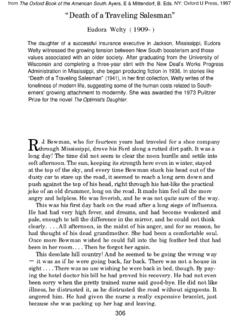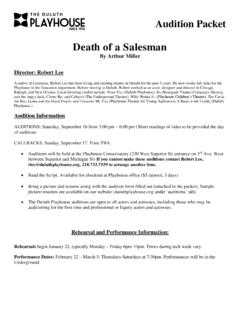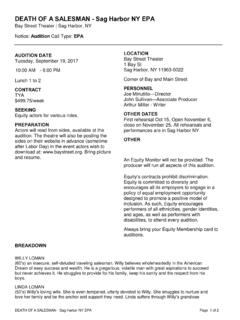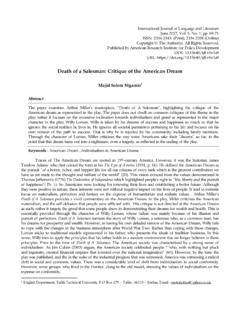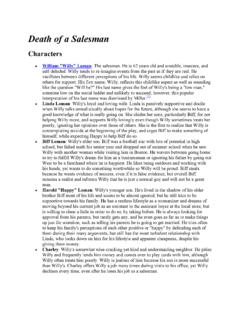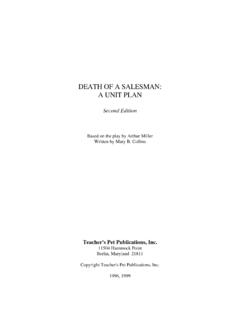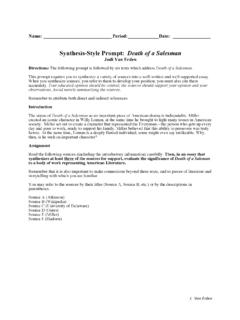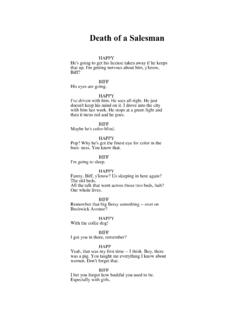Transcription of Death of a Salesman-Group 4 Symbolism, Imagery, …
1 Death of a Salesman-Group 4 Symbolism, Imagery, Irony, Questions 3 &4, Happy and Bernard Characterization Archetypal/Psychological Analysis Pooja Pujara Michelle Wong Neha Harlalka Young-Ji Kim Period 5 Imagery Flute- The flute plays on. He hears the flute but is not aware of it. A melody is head, played upon by a flute. It is small and fine, telling of grass and trees and the horizon. The flute fades away by the time that Willy comes home and starts talking to Linda after work in the beginning of the story. All of the apartments around the house are in an angular shape. We are aware of towering, angular shapes behind it, surrounding it on all sides.
2 Blue light is used to describe the sky and the overly optimistic bubble that Willy seems to live in. - Only the blue light of the sky falls upon the house and forestage Angry orange light around the house is used to contrast the blue light on the house. This may represent the contrast from Willy's perception of the American dream, to the actual reality of America. The surrounding area shows and angry glow of orange. Even the kitchen, which is stereotypically a woman's place, has three chairs which may signify male dominance, a theme which is seen repeatedly throughout the story. The entire setting is wholly or, in some places, partially transparent.
3 An air of the dream clings to the place, a dream rising out of reality. This shows/represents Willy's gradual return to reality after his illusions. Even as he crosses the doorway of the house, his exhaustion is lets his burden down, feeling the soreness of his palms. This describes how utterly drained Willy is when he comes home. They way they boxed us in 's not a breath of fresh air in the neighborhood. This signifies that Willy feels trapped. Remember those two beautiful elm trees out there? Willy feels nostalgic. From the darkness is heard the laughter of a woman. Willy doesn't turn to it, but it continues through Linda's lines.
4 The laughter is loud now and he moves into a brightening area at the left, where the Woman has come from behind the scrim and is standing, putting on her hat, looking into a mirror and laughing. Biff (He touches her hair) Your so gray. o Linda: Its been gray since you were in high school. I just stopped dying it that's all. o Biff: Dye it again, will ya? I don't want my pal looking old. o Linda: You're such a boy! You think you can go away for a year 've got to get it into your head now that one day you'll knock on this door and there will be strange people here. This refers to her or Willy dying. o Biff: What are you talking about, you're not even sixty, mom?
5 O Linda: But what about your father? All of this emphasizes that that At the restaurant the light is red, Charlie stares after him a moment and follows. All light blacks out. Suddenly raucous music is heard and a red glow rises behind the screen at right. Knocking is heard off left. The Woman enters, laughing. Willy follows her. She is in a black slip; he is buttoning his shirt. Raw, sensuous music accompanies their speech. This obviously shows that something passionate and sensual has occurred. Even the music and their speech reflects their actions (assumed past and stated present). The fact that Willy and Biff have their face-off at night, may signify Willy's upcoming Death .
6 As the cars speeds off, the music crashes down in a frenzy of sound, which becomes the soft pulsation of a single cello string. This signifies Willy's suicide. During the funeral the flute starts playing again, and is the last thing that continues as the curtains close. Irony -The audience is not directly involved in the story. Although the audience knows about the other Woman, it is never directly addressed through asides or soliloquies. 1. Willy, despite drinking coffee, still doesn't feel alert on the road. This can be categorized as situational irony. 1. Willy: I got as far as a little above Yonkers. I stopped for a cup of coffee.
7 Maybe it was the coffee. 2. Linda: What? 3. Willy: I suddenly couldn't drive anymore. The car kept going onto the shoulder, you know? 2. Even though Biff dislikes the smell of cigarettes he still decided to take a smoke. 1. Biff: You smoking? 2. Happy (holding out a pack of cigarettes): Want one? 3. Biff (taking a cigarette): I can never sleep when I smell it. 3. It's ironic that Happy isn't happy/content. He is lonely. He says, Sometimes I sit in my apartment- all alone. And I think of the rent I'm paying. And it's crazy. But then it's what I always wanted. My own apartment, a car, and plenty of women. And still, goddammit, I'm lonely.
8 4. It's ironic that Happy and Biff want to go out west, when that is what Willy wanted to do in the first place, and that Happy and Biff are ashamed of him, when it's what he wanted to do. 5. Willy thinks that he is superior to Charlie, and doesn't want to work for Charlie because it will make him feel inferior but he has to ask for money from Charlie. 1. Charlie: Why must everybody like you? Who liked Morgan? Was he impressive? In a Turkish bath he looked like a butcher. But with his pockets on, he was very well , listen, Willy, I know you don't like me, and nobody can say I'm in love with you, but I'll give you a job because-just for the hell of it, put it that way.
9 Now what do you say? 2. Willy: I-I-just can't work for you, Charlie. 3. Charlie: What are you, jealous of me? 4. Willy: I can't work for you, that's all, don't ask me why. 5. Charlie: You've been jealous of me all your life you damn fool! Here, pay your insurance. 6. Another irony is Willy's suicide in itself. He decided that he needed to take his own life to prove to Biff that he was well liked (by the amount of people at his funeral). However, only two people other than family showed up. 7. Lastly, Willy also wanted to commit suicide so that Biff could get his life insurance money, but the insurance company didn't cover the suicide.
10 Additionally, the day after he died, the last bills of the house had been payed off, so his Death was more or less in vain. 8. Bernard seems to be the perfect picture that Willy wanted Biff to become, and what Willy himself wanted to become. One key clue is that Bernard has two sons, just like Willy. "W: Did I hear your wife had a boy? B: That's right. Our second. W: Two boys! What do you know!" Bernard has a high-paying job and holds a high social status, by being acquainted with a person who is located near the Supreme Court, he has a court case there, he is happily married to his wife, and he makes his father proud. Character Analysis Happy Happy, youngest son of Willy, is an unchanging (static) character.
